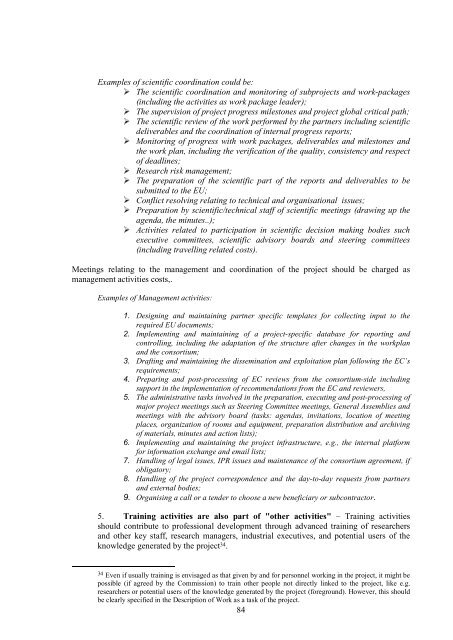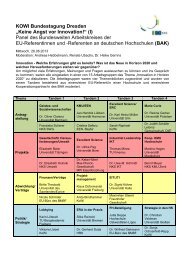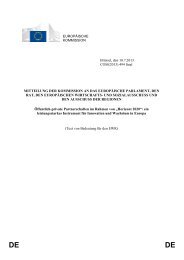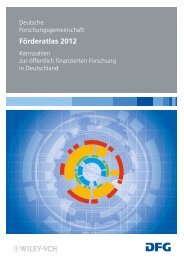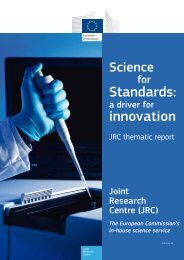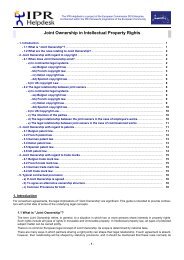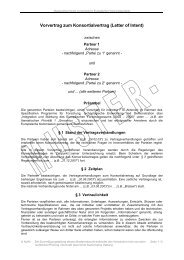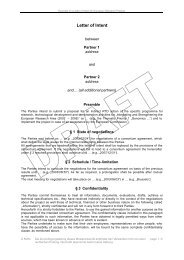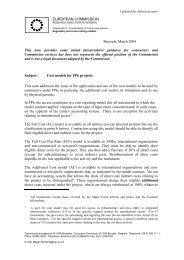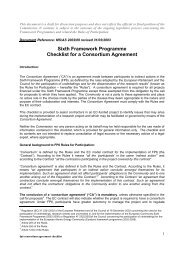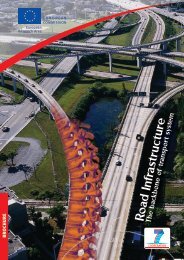Guide to Financial Issues relating to FP7 Indirect Actions - KoWi
Guide to Financial Issues relating to FP7 Indirect Actions - KoWi
Guide to Financial Issues relating to FP7 Indirect Actions - KoWi
You also want an ePaper? Increase the reach of your titles
YUMPU automatically turns print PDFs into web optimized ePapers that Google loves.
Examples of scientific coordination could be:<br />
The scientific coordination and moni<strong>to</strong>ring of subprojects and work-packages<br />
<br />
(including the activities as work package leader);<br />
The supervision of project progress miles<strong>to</strong>nes and project global critical path;<br />
<br />
The scientific review of the work performed by the partners including scientific<br />
<br />
deliverables and the coordination of internal progress reports;<br />
Moni<strong>to</strong>ring of progress with work packages, deliverables and miles<strong>to</strong>nes and<br />
<br />
the work plan, including the verification of the quality, consistency and respect<br />
of deadlines;<br />
Research risk management;<br />
<br />
The preparation of the scientific part of the reports and deliverables <strong>to</strong> be<br />
<br />
submitted <strong>to</strong> the EU;<br />
Conflict resolving <strong>relating</strong> <strong>to</strong> technical and organisational issues;<br />
<br />
Preparation by scientific/technical staff of scientific meetings (drawing up the<br />
<br />
agenda, the minutes..);<br />
Activities related <strong>to</strong> participation in scientific decision making bodies such<br />
<br />
executive committees, scientific advisory boards and steering committees<br />
(including travelling related costs).<br />
Meetings <strong>relating</strong> <strong>to</strong> the management and coordination of the project should be charged as<br />
management activities costs,.<br />
Examples of Management activities:<br />
1. Designing and maintaining partner specific templates for collecting input <strong>to</strong> the<br />
required EU documents;<br />
2. Implementing and maintaining of a project-specific database for reporting and<br />
controlling, including the adaptation of the structure after changes in the workplan<br />
and the consortium;<br />
3. Drafting and maintaining the dissemination and exploitation plan following the EC’s<br />
requirements;<br />
4. Preparing and post-processing of EC reviews from the consortium-side including<br />
support in the implementation of recommendations from the EC and reviewers,<br />
5. The administrative tasks involved in the preparation, executing and post-processing of<br />
major project meetings such as Steering Committee meetings, General Assemblies and<br />
meetings with the advisory board (tasks: agendas, invitations, location of meeting<br />
places, organization of rooms and equipment, preparation distribution and archiving<br />
of materials, minutes and action lists);<br />
6. Implementing and maintaining the project infrastructure, e.g., the internal platform<br />
for information exchange and email lists;<br />
7. Handling of legal issues, IPR issues and maintenance of the consortium agreement, if<br />
obliga<strong>to</strong>ry;<br />
8. Handling of the project correspondence and the day-<strong>to</strong>-day requests from partners<br />
and external bodies;<br />
9. Organising a call or a tender <strong>to</strong> choose a new beneficiary or subcontrac<strong>to</strong>r.<br />
5. Training activities are also part of "other activities" – Training activities<br />
should contribute <strong>to</strong> professional development through advanced training of researchers<br />
and other key staff, research managers, industrial executives, and potential users of the<br />
knowledge generated by the project 34 .<br />
34 Even if usually training is envisaged as that given by and for personnel working in the project, it might be<br />
possible (if agreed by the Commission) <strong>to</strong> train other people not directly linked <strong>to</strong> the project, like e.g.<br />
researchers or potential users of the knowledge generated by the project (foreground). However, this should<br />
be clearly specified in the Description of Work as a task of the project.<br />
84


